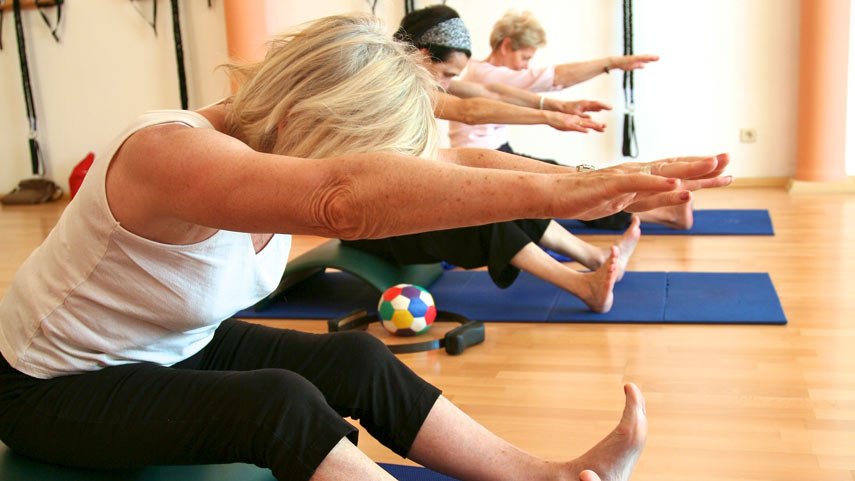Pilates During Menopause: Active Recalibration in Midlife
Menopause is a significant transition in a woman’s life, often accompanied by various physical and emotional changes. Maintaining an active lifestyle during this period can greatly enhance overall well-being. Pilates, known for its low-impact yet highly effective approach to fitness, is particularly beneficial during menopause. This article delves into how Pilates can support women through this phase, promoting strength, flexibility, and mental clarity.
Understanding Menopause
Menopause marks the end of a woman’s reproductive years, typically between ages 45 and 55. It’s characterized by the cessation of menstrual periods and a decline in estrogen levels, leading to various symptoms such as hot flashes, night sweats, mood swings, weight gain, and decreased bone density. These changes can be challenging, but staying active with a focused exercise routine like Pilates can help manage and alleviate many symptoms.
Benefits of Pilates During Menopause
Pilates offers many benefits, making it an ideal exercise choice during menopause. Here’s how Pilates can support women through this transitional period:
Strengthening the Core
Pilates is renowned for its emphasis on core strength. A strong core supports the spine, improves posture, and enhances balance—all crucial factors as the body changes during menopause. Engaging the deep abdominal muscles helps Pilates maintain stability and prevent back pain, which can become more prevalent during this time.
Enhancing Flexibility and Mobility
As we age, maintaining flexibility and mobility becomes increasingly important. Pilates exercises involve controlled movements that stretch and lengthen muscles, improving overall flexibility. This can alleviate stiffness and joint pain, common complaints during menopause, and enhance overall mobility.
Supporting Bone Health
Decreased estrogen levels during menopause can lead to a decline in bone density, increasing the risk of osteoporosis. Pilates includes weight-bearing exercises that stimulate bone growth and strengthen the muscles supporting the bones. This can help mitigate bone loss and reduce the risk of fractures.
Boosting Mental Health
The hormonal fluctuations during menopause can impact mental health, leading to mood swings, anxiety, and depression. Pilates incorporates mindful movement and breathing techniques, promoting relaxation and reducing stress. This mind-body connection can enhance mental clarity and emotional stability, providing much-needed balance during menopause.
Aiding Weight Management
Weight gain is a common concern during menopause due to hormonal changes and a slowing metabolism. While Pilates may not burn as many calories as high-intensity workouts, it helps build lean muscle mass, which can boost metabolism. Combined with a healthy diet and other forms of exercise, Pilates can support effective weight management.
Tailoring Pilates for Menopause
It’s essential to tailor Pilates exercises to suit individual needs during menopause. Here are some considerations and modifications to optimize your Pilates practice:
Focus on Gentle Movements
During menopause, the body might be more susceptible to aches and pains. Focus on gentle, low-impact movements that promote flexibility and strength without causing strain. Exercises like the pelvic tilt, spine stretch, and leg circles are excellent choices.
Incorporate Reformer Pilates
Reformer Pilates uses a specialized machine with adjustable springs to offer added support and resistance. This can enhance the effectiveness of your workout, providing a safe and controlled environment to build strength and flexibility. The reformer machine can particularly benefit those experiencing joint pain or limited mobility.
Prioritize Consistency
Consistency is critical to reaping the benefits of Pilates. Aim to practice Pilates 2-3 times per week. Regular sessions will help maintain muscle tone, flexibility, and mental well-being. Consider joining a class or working with a certified instructor to ensure proper technique and motivation.
Listen to Your Body
Menopause affects every woman differently. Listening to your body and adjusting your Pilates practice is crucial. Modify the exercises or take a break if you experience any discomfort or pain. Consulting with a healthcare provider or a Pilates instructor with experience working with menopausal women can provide valuable guidance.
Starting Pilates During Menopause
If you’re new to Pilates, starting with a beginner’s class or a private session with a certified instructor can be beneficial. They can guide you through the basics and help tailor the exercises to your needs. Here are some steps to get started:
Find a Reputable Studio
Look for a Pilates studio with experienced instructors who understand the unique challenges of menopause. A supportive environment can significantly improve your experience and results.
Set Realistic Goals
Set achievable goals for your Pilates practice. Whether improving flexibility, reducing stress, or managing weight, having clear objectives can keep you motivated and focused.
Combine with Other Activities
While Pilates is highly beneficial, combining it with other forms of exercise like walking, swimming, or yoga can provide a well-rounded fitness routine. Variety in your workouts can enhance overall health and well-being.
Conclusion
Pilates offers a gentle yet effective way to navigate the challenges of menopause, promoting physical strength, flexibility, and mental clarity. By incorporating Pilates into your routine, you can actively recalibrate your body and mind during this significant transition. At Corpus Studios in Brussels, we offer tailored Pilates classes designed to support women through menopause. Join us and discover the transformative power of Pilates in enhancing your midlife journey. Embrace this new chapter with strength, balance, and serenity.





